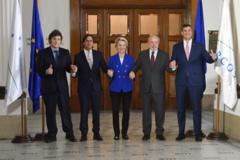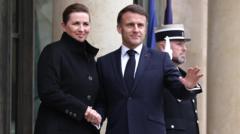The new trade deal, announced in Montevideo, marks a significant milestone in EU-Mercosur relations, aiming to facilitate mutual trade and investment.
EU Signs Historic Trade Agreement with South America

EU Signs Historic Trade Agreement with South America
A landmark trade agreement between the European Union and Mercosur is unveiled, promising economic growth and lower tariffs.
The European Union has solidified a groundbreaking trade deal with South America's leading economies—Argentina, Brazil, Paraguay, and Uruguay—in a momentous announcement made by European Commission President Ursula von der Leyen in Montevideo. She described the agreement as a "truly historic milestone" amidst rising global tensions.
Unlike the prior agreement from 2019, which failed to materialize due to ratification reluctance among EU member states, this new pact aims to lower tariffs, expedite customs procedures, and grant European companies greater access to essential raw materials. "It means more jobs and good jobs, more choices and better prices," Ms. von der Leyen emphasized, noting the benefits this would bring to European citizens.
In 2022, European exports to these four South American countries amounted to nearly $59 billion, including significant commodities like cars, machinery, and pharmaceuticals. In turn, EU imports from the region totaled about $57 billion, mainly consisting of lithium, nickel, meat, and vegetables—key resources for the booming electric vehicle industry. This trade agreement is expected to enhance access to these crucial materials for European manufacturers.
With a combined market of 700 million consumers and accounting for around 20% of the global economy, leaders from both the EU and Mercosur express optimism about the potential growth this agreement may unleash. The EU estimates that around 60,000 of its companies engage in trade with Mercosur members, half of which are small enterprises.
Negotiations for this trade deal commenced in the year 2000. The previous agreement did not advance due to concerns from EU member states regarding sustainable farming practices and environmental protection. The European Commission leads these trade policy negotiations, but countries like France, Italy, and Poland have voiced skepticism about the current deal's implications for their farmers, citing potential unfair competition.
Following the announcement, France's Trade Minister Sophie Primas took a stand on social media, asserting, "What is happening in Montevideo is not a signing of the agreement but simply the political conclusion of the negotiation. This does not bind the member states," stressing her commitment to represent the interests of those concerned.
Germany's government agency, however, welcomed the agreement as an essential opportunity for revitalizing foreign trade, particularly during an economic downturn. Government spokeswoman Christiane Hoffmann reaffirmed the necessity of finding a resolution accommodating France's apprehensions and ensuring the deal's ratification.






















